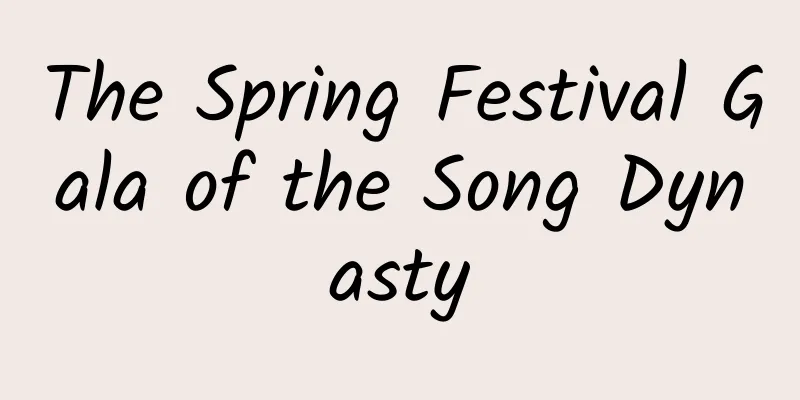The Spring Festival Gala of the Song Dynasty

|
Did the Song Dynasty also have a "Spring Festival Gala"? Not strictly speaking, yes. Because according to convention, every New Year's Day (the first day of the first lunar month), the court would hold a state banquet, and the participants included the Song Dynasty monarch, civil and military officials, and "New Year's envoys" sent by Liao, Xixia, Goryeo, Dali, etc. During the banquet, as usual, there were entertainment programs such as singing and dancing, acrobatics, and dramas performed by Jiaofang actors. This set of entertainment programs performed at the New Year's Day state banquet can be called the "Spring Festival Gala" of the Song Dynasty. The Spring Festival Gala of the Song Dynasty not only had entertainment performances, but also hosts, or announcers, called "bamboo poles" because they always held a "bamboo pole whisk" when they appeared on stage to announce the show. All large-scale entertainment performances at state banquets in the Song Dynasty had "bamboo poles" hosting the show. The announcements read by the "bamboo poles" were called "Jiaofang Ci" by the Song people. They were usually written by Hanlin scholars. The scholar Su Shi, who is familiar to us, wrote several sets of "Jiaofang Ci", including "Jiaofang Ci for the First Day of the Purple Palace" in the fourth year of Yuanyou (1089). Translated into modern terms, it is "The Host's Thread for the Spring Festival Gala in the Purple Palace in the Year of the Snake in 1089". The style of Su Shi's "Jiaofang Ci" is really similar to the announcements of the 1980s. In order to let you appreciate the style of the announcements, I will translate some of Su Shi's "Jiaofang Ci" into the style of announcements. Through the "Jiaofang Ci" written by Su Shi and referring to the description of the state banquet and entertainment performances on Tianning Festival (the birthday of Emperor Huizong of Song) in "Dongjing Menghualu", we can restore the general process of the "Spring Festival Gala" in the Song Dynasty. During the Spring Festival banquet of the Song Dynasty, nine cups of imperial wine were drunk as usual. After each cup of wine, an entertainment program was enjoyed. The entertainment programs for the first and second cups of wine were both singing and dancing: first, the "ge banse" (singers from the Jiaofang) sang a song; then the dancers came in and "danced for a few beats". The third wine performance was a very exciting "Hundred Plays": "The performers, male or female, all wore red scarves and colorful clothes. There was a stone pillar nest in front of the hall. The performers came on stage and erected their poles in the "stone pillar nest" of the banquet hall. Why did they erect the poles? Because the "Hundred Plays" mentioned by the Song people refer to "climbing poles, jumping ropes, standing upside down, bending waists, playing with cups and pouring wine, kicking bottles, somersaults, and holding things up", all of which were performed on poles, which are today's acrobatics. At the fourth glass of wine, the "bamboo pole" would go on stage to give a speech, saying some auspicious and festive blessings. For example, Su Shi wrote a speech for the New Year's Day banquet in the Purple Palace in the fourth year of Yuanyou: "Your Majesty, you are extremely benevolent and have been blessed. You follow the movement of the four seasons of heaven and earth, but people use it every day without knowing it. You inherit the mind of the six saints of our ancestors, and I do nothing but change myself. The nine virtues are all in the work, and it will be accomplished in three years. You first control the harmony of the eight sounds to attend the New Year's Day. People and gods celebrate together, and the barbarians and Chinese come together." After "Zhu Ganzi" finished his speech, all the actors in the Jiaofang shouted slogans in unison: "A thunderclap sounded in the sky, and all things were flourishing. The morning sun came out with the celestial chariot, and the spring breeze did not wait for the return of the Big Dipper." Then, "Zhu Ganzi" said in a reciting tone: "The east wind brought the melody of spring, and the dancers welcomed the spring sunshine. We drink to welcome the spring, and we sing and dance. Please invite the Jiaofang to sing a chorus." (Su Shi's original text: The east wind responds to the rhythm, and the southern flute is in the courtyard. Farewell to the New Year and welcome the spring, and celebrate the meeting of the three courts; singing and playing the flute, I wish to hear the harmony of the nine music. To please the emperor, the Jiaofang will sing a chorus.) The actors in the Jiaofang came on stage to chorus. After the chorus, the fifth cup of wine was drunk, and it was the turn of the children's team to perform a large-scale dance. The "bamboo pole" came out first to announce: "The performances of all the artists are so wonderful that we are all eager to try. At this time when spring has returned to the earth, the children can't help but want to perform on the stage. Now, please welcome the children's team from the Jiaofang." (Su Shi's original text: The artists played their skills, and all of them jumped up and down in the courtyard; the children heard the music and also flew back to the music. They were all enjoying themselves, so how could they interrupt the little feelings. The emperor was pleased, and the children from the Jiaofang joined the team.) The children's team of the Jiaofang is composed of more than 200 young artists aged about 12 or 13. They wear scarlet green and purple flowered clothes, hold flower branches in their hands, and enter the stage in four lines. The four purple-clothed teenagers in the lead hold gold-plated signs and beat drums. The sign reads the name of the children's team: "The fairy mountain comes to the red festival, and the sea of clouds plays with the wild geese." "Zhuganzi" first asked the leader of the children's team: "Young man, do you have any feelings to express about your performance today?" (Su Shi's original text: Why do those young friends want to show their abilities? If you are sincere, please come forward and play.) The young leader came forward to speak and said some auspicious words. Then, "the music started, and (the young people) danced and sang together, dancing and singing." After the children's dance, the actors from the Jiaofang came on stage to perform a variety show. The variety shows of the Song Dynasty were different from those of the Yuan, Ming and Qing dynasties. The Yuan, Ming and Qing dynasties were complete dramas, while the Song Dynasty's variety shows were short and funny performances, so they were also called "funny plays", which were similar to today's crosstalk and sketches. The variety shows at state banquets usually had two sections. The first section was called the "erotic section", which was performed by the actors on the spot to make people laugh; the second section was the real variety show, which was a drama performance with a script. Song Dynasty actors performed "erotic dramas" and liked to incorporate current affairs into their plays, specifically making fun of high-ranking officials. The well-known powerful officials of the Song Dynasty, such as Wang Anshi, Cai Jing, Qin Hui, Han Tuozhou, Shi Miyuan, etc., were all severely ridiculed by the actors. By the way, Su Shi, who wrote many "jiaofang ci", was also ridiculed by the actors. To let you see the style of the Song Dynasty dramas satirizing current affairs, I will retell a farce performed in the inner court during the reign of Emperor Huizong of Song: Three actors played the roles of a Confucian scholar, a Taoist priest and a monk, each explaining their doctrines. The Confucian scholar first said, "What I learned is benevolence, righteousness, propriety, wisdom and trustworthiness, which are called the 'Five Constant Virtues'." He then quoted scriptures to explain the great meaning of the "Five Constant Virtues." The Taoist priest then said, "What I learned is gold, wood, water, fire and earth, which are called the 'Five Elements'." He also quoted scriptures and praised the doctrine. When it was the monk's turn to speak, he put his palms together and said, "You two are just talking nonsense. It is not worth listening to. What I have learned is the suffering of birth, old age, sickness, death, and so on, which is called the 'five transformations'. The Tibetan scriptures are profound and far-reaching, and are beyond your reach. I will explain to you the wonderful principles of the Buddhas and Bodhisattvas of the present world. If you are not convinced, please ask me." The Confucian scholar and the Taoist asked him, "What is life?" The monk said, "From the Imperial College to the counties, all the scholars are called "Sanshe students". They have luxurious houses and delicious food, monthly examinations and quarterly exams, and three-yearly exams. They can take off their white robes and wear green robes, and even become ministers. This is how the country treats life." He asked again, "What is old age?" The monk said, "When one is old and lonely and poor, one will surely fall into poverty. Now we have established homes for the elderly (welfare nursing homes in the Song Dynasty) to take care of them throughout their lives. The state also treats the elderly in the same way." He asked again, "What is illness?" The monk said, "If you are unfortunate enough to get sick and your family is too poor to save you, then there is the Anjifang (a welfare hospital in the Song Dynasty), where you can stay, send doctors and give you medicine, and guarantee that it will be completely effective. It is the same with illness." He asked again, "What is death?" The monk said, "Death is inevitable for everyone, but the poor have nowhere to go. So we choose an empty plot of land to build a Louze Garden (the Welfare Cemetery in the Song Dynasty). If we don't have a place to bury our dead, we will give them a coffin and bury them. In spring and autumn, we will offer sacrifices to them, and their grace will be extended to the springs and the earth. This is how death is." Finally, he asked, "What is suffering?" The monk "closed his eyes and did not answer," with a very sad look on his face. After the Confucian scholar and the Taoist urged him again and again, the monk "frowned" and replied, "It's just that ordinary people suffer immeasurable suffering." The zaju actors performed this play to satirize the "national welfare policy" implemented by Emperor Huizong of Song and Prime Minister Cai Jing at the time, which led to heavy taxes and caused the people to suffer "immeasurable suffering". After hearing this, Emperor Huizong "felt compassion and thought for a long time, but did not think it was a crime". This also shows the extraordinary courage and insight of the zaju actors in the Song Dynasty. However, when the actors of the Song Dynasty performed zaju at the Spring Festival Gala, they still had to be tactful and "dared not make jokes" because there were foreign "envoys congratulating the New Year" present and they could not lose their manners. In other words, if there were no foreign envoys present, the zaju actors would have performed very wildly. As we all know, Cuju was popular in the Song Dynasty, and the players' skills were unrivaled in the world. Of course, they had to show off their skills in the "Spring Festival Gala". So, when drinking the sixth cup of wine, "a goal was erected in front of the palace, about three feet high, with a colorful net and a foot of door left open", and the two "royal football teams" of the Song Dynasty appeared: the left army of sixteen people, wearing red brocade shirts; the right army of sixteen people, all wearing blue brocade clothes, stood on both sides of the goal (yes, the goal of Cuju in the Song Dynasty was set in the middle of the court), and the winning side could get a "silver bowl of brocade". The seventh wine was performed by the girls' team, which consisted of more than 400 young girls with extraordinary beauty, and their performance style was similar to that of the children's team. The eighth glass of wine was served, and the audience sang a song called “Ge Ban Se” again. After the ninth glass of wine, the "Royal Sumo Wrestlers" of the Song Dynasty came on stage to perform a sumo match. As the ninth cup of wine was finished, the sumo match ended, and the "bamboo pole" came on stage to give a closing speech: "This night is unforgettable, we share the songs of the prosperous times; this night is unforgettable, we will compose the music tomorrow. Let us bid farewell to your majesty and go home happily." (Su Shi's original text: The wine is finished in the golden palace, and the grace of the dew is evenly distributed; the water clock is reduced in the copper pot, and the music is full of elegance. Looking at the red steps, I extend my wishes, and straighten my green sleeves to say goodbye. I bow again to the steps of heaven, and we will go well.) At this point, the Song Dynasty’s “Spring Festival Gala” came to an end. |
Recommend
[Practical Information] The latest Android app market [Special Application] is open for registration for a limited time, so grab it now!
The fresh and hot application market activities i...
User Operation | How to do user behavior path analysis?
User behavior path analysis is a type of data ana...
Tencent practical case! Review of QQ dream expression design
The deep integration of "Internet + charity&...
How Li Jiaqi and Perfect Diary use WeChat private domain traffic
The current first-line live-streaming influencers...
Is it expensive to customize the Jining Book Mini Program? Jining Books Mini Program Customization Cost and Process
According to industry insiders, mini programs wil...
Apple officially released iOS 9, which seems quite tempting
Fans can breathe a sigh of relief. After several ...
Tik Tok marketing strategy and case analysis!
Delivery is like fighting a war. Many times the o...
Two scenarios for Zhihu content to promote sales
Yesterday a client asked me why my popular conten...
Practical course on sharing good products through short videos: quick account creation and upgraded anti-transfer editing
Practical course on sharing good products with sh...
New energy vehicles must achieve low-carbon power batteries through cost
At present, the number of new energy vehicles in ...
Intel evaluates AMD Ryzen: Kaby Lake is enough to suppress
AMD Ryzen processor will be available at the end ...
Massive Qianchuan advertising crowd targeting skills
Recently, Juliang Qianchuan launched the crowd pa...
The concept version of macOS can use iOS applications. Will Apple integrate the two major systems?
The PC market as a whole still did not recover in...
Building a brand’s own broadcast account matrix!
On May 25, Douyin’s 618 Good Products Festival en...
The "Yue" is not ordinary! It is a "private order" for ancient kings and princes
Knife, sword, halberd, spear, halberd, axe...How ...








![[Eleven Years of Value] 2022 Little Goose No. 3 - Performance surges, volume and price rise, hidden champion leader, a company with huge future growth potential](/upload/images/67cc0ac3d3905.webp)
